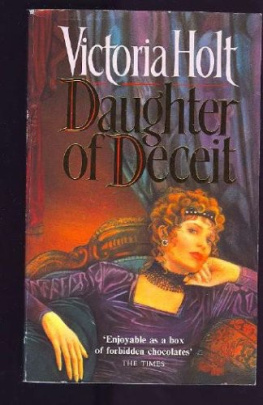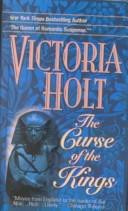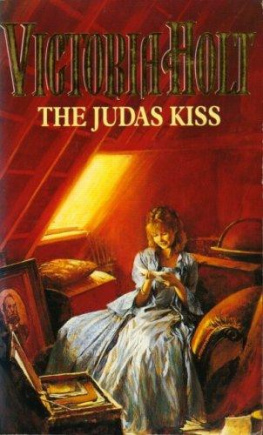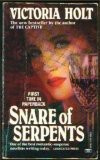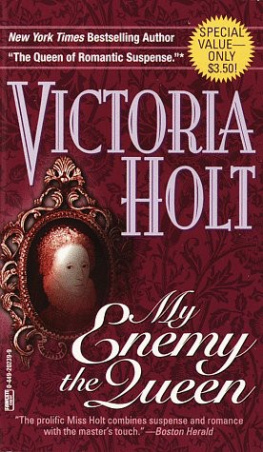Victoria Holt - Daughter of deceit
Here you can read online Victoria Holt - Daughter of deceit full text of the book (entire story) in english for free. Download pdf and epub, get meaning, cover and reviews about this ebook. year: 1991, publisher: Fontana, genre: Science fiction. Description of the work, (preface) as well as reviews are available. Best literature library LitArk.com created for fans of good reading and offers a wide selection of genres:
Romance novel
Science fiction
Adventure
Detective
Science
History
Home and family
Prose
Art
Politics
Computer
Non-fiction
Religion
Business
Children
Humor
Choose a favorite category and find really read worthwhile books. Enjoy immersion in the world of imagination, feel the emotions of the characters or learn something new for yourself, make an fascinating discovery.
- Book:Daughter of deceit
- Author:
- Publisher:Fontana
- Genre:
- Year:1991
- Rating:3 / 5
- Favourites:Add to favourites
- Your mark:
- 60
- 1
- 2
- 3
- 4
- 5
Daughter of deceit: summary, description and annotation
We offer to read an annotation, description, summary or preface (depends on what the author of the book "Daughter of deceit" wrote himself). If you haven't found the necessary information about the book — write in the comments, we will try to find it.
Daughter of deceit — read online for free the complete book (whole text) full work
Below is the text of the book, divided by pages. System saving the place of the last page read, allows you to conveniently read the book "Daughter of deceit" online for free, without having to search again every time where you left off. Put a bookmark, and you can go to the page where you finished reading at any time.
Font size:
Interval:
Bookmark:
DAUGHTER OF DECEIT
Victoria Holt
LONDON

Desiree

I often wonder how different my life might have been if Lisa Fennell had not made her dramatic entry into it; and I marvel that if people had not been in a certain place at the same moment they might never have been aware of each others existence and their lives would have taken an entirely different course.
I cannot believe that there was another household like ours in the whole of Londonor England, for that matter. I only knew that I was lucky to be part of it because it was dominated by the lighthearted, wildly unconventional, inimitable and altogether adorable Desiree.
At that time social status was held to be of the greatest importance in all classes of society and protocol in the servants quarters was as rigidly adhered to as it ever was in higher circles. Not so by Desiree. Carrie, the tweeny, was given the same treatment as Mrs. Crimp, the housekeeper. Not always with Mrs. Crimps approval. But Desiree ignored that.
Hello, Carrie, how goes it with you today, love? she would ask when she met Carrie about the house. Everyone was love or dear to Desiree. Carrie would squirm with delight.
Im all right, Miss Daisy Ray, she would say. And hows yourself?
Bearing up. Bearing up, Desiree would say with a grin; and if she was aware of Mrs. Crimps disapproving look, she gave no sign.
Everyone in the household loved Desireeapart from two of the governesses who had come when I was five years old to teach me the rudiments of education. One left after a few months, because there were always late-night comings and goings to and from the house and she needed her rest; the other went off to teach an earls daughter, which was more suited to what she had been brought up to expect.
But most people, once they had accepted that this household was like no other, succumbed to Desirees charmMartha Gee with a sort of exasperated tenderness; Mrs. Crimp with a few tut-tuts and a certain twist of the lips and a muttered What next? I wonder; Jane, the parlourmaid, with the utmost eagerness, because in her dreams she hoped to be another Desiree; and Carrie with unadulterated delight, because she had never known anyone who made her feel important before; while Thomas, the coachman, was loyally devoted, in the belief that anyone as famous as Desiree might act a little strangely if she felt like it.
As for myself, she was the very centre of my life.
I remember one occasion when I was about four years old. It was night and I awoke, probably aroused by the sounds of laughter coming from below. I sat up in bed listening. The door which connected my room with the nannys was kept open. I crept to it, saw that she was sleeping deeply, put on my dressing gown and slippers, and descended the staircase. The laughter was coming from the drawing room. I reached it and stood outside listening.
Then I turned the handle and looked in.
Desiree, in a long flowing gown of lavender-coloured silk, was seated on the sofa; her golden hair was piled high on her head; there was a black velvet band round it in which stones glittered. Every time I saw her I was struck by her beauty. She was like the heroine of one of the fairy stories which I loved, but chiefly I thought of her as Cinderella after she had gone to the ball and found her princeonly Desiree had found several.
A man sat on either side of her and another was standing up, leaning over her, laughing. Their black jackets and white shirt-fronts made a pleasant contrast to the lavender silk. They were silent as I entered and they all looked at me. It was like a tableau.
Is this a party? I asked, implying that if it was I wanted to be part of it.
Desiree held out her arms and I ran into her sweet-smelling embrace.
She presented me to the company. I had become aware by this time that there were others in the room besides the three men and herself.
She said: This is my treasure, Noelle, because she was born on Christmas Daythe best Christmas present I ever had.
I had already heard it. She had told me: You were born on Christmas Day, so you were called Noelle, which means birthday Christmas birthday. She added that I was specially honoured because I shared my birthday with Jesus.
What concerned me at the moment was that it was a party and I had joined it.
I remember sitting on Desirees lap while she, with mock seriousness, introduced me to certain members of the company.
This is Charlie Claverham, and this is Monsieur Robert Bouchere and this is Dolly.
They were the three I had noticed gathered about her when I entered the room. I studied themin particular Dolly, because it seemed such a strange name for a man to have. He was rather square in shape, with fair whiskersslightly gingerishand a strong aroma which, when I became experienced in such matters, I recognized as a mingling of expensive cigars and whisky. I also learned that he was Donald Dollington, actor-manager, known irreverently in theatrical circles as Dolly.
They all made much of me, asking questions and seeming amused at the answers, which made me feel that it was a wonderful party until I fell asleep and was vaguely aware that Desiree was carrying me back to my bed. I remember being disappointed when I woke up next morning to find that the party was over.
The house was near Drury Lane, handy for the theatre, which was essential. It seemed enormous to me when I was very youngan exciting place with stairs leading down to the basement and then from the ground floor up to the fourth. There was always something exciting to be seen from the nursery windows, over which Desiree had had bars put, lest I fall out.
There were people selling things from wheelbarrows or from trays on straps round their neckshot pies, lavender, fruit, flowers, pins and ribbons; then there were carriages and hackney cabs taking people to and from the theatres. I loved to watch them.
When I was six years old, Miss Mathilda Grey came to teach me. This was after the other two governesses had left to find more suitable employment. She must have been a little bewildered when she first came, and might have gone the way of the other two but for the fact that she wanted to become an actress. Not like your mother, she pointed out. Not just singing and dancing in light comedies, but a real actress.
I studied Mathilda Grey. She had scarcely the physique for a dancer. My mother was rather tall and she had what they called an hourglass figure. Miss Grey was short and dumpy and all she could manage to do was warble a little out of tune. But Lady Macbeth and Portia were not called upon to sing and dance. However, her ambitions, misguided though they might have been, prompted her to stay in a post which brought her a little nearer to the theatrical world than she could otherwise have hoped for.
But after a while she became reconciled and, I think, enjoyed being part of the household.
The most important one was Martha Gee, my mothers dresser but more than that; and she took charge of us all as well as of my mother. She was a large woman with keen dark eyes which missed little and brown hair drawn severely back into a large knob; she was always dressed in black. She was fond of reminding us that, having been born within the sound of Bow Bells, she was without doubt a cockney. She was sharp, shrewd, taking, as she said, nothing from nobody and always giving as good as she got and a little bit more.
She had known my mother when she had been a member of the chorus, and if Martha Gee could not spot talent when she saw it, she did not know who could. She had decided to take my mother under her wing and guide her where she should go; and it seemed that this was exactly what she had done. Martha was about forty years of age. She knew her way around and had seen a bit of life. She told us often that she belonged to the theatre and knew all the tricks that some of them got up to, which offers to be wary of and which you seized with both hands. She bullied my mother as she did all of us, but she made us feel that it was for our own good and that Martha knew best. She treated my mother as though she were a wayward child. My mother liked it and used to say, What would I do without Martha?
Next pageFont size:
Interval:
Bookmark:
Similar books «Daughter of deceit»
Look at similar books to Daughter of deceit. We have selected literature similar in name and meaning in the hope of providing readers with more options to find new, interesting, not yet read works.
Discussion, reviews of the book Daughter of deceit and just readers' own opinions. Leave your comments, write what you think about the work, its meaning or the main characters. Specify what exactly you liked and what you didn't like, and why you think so.

